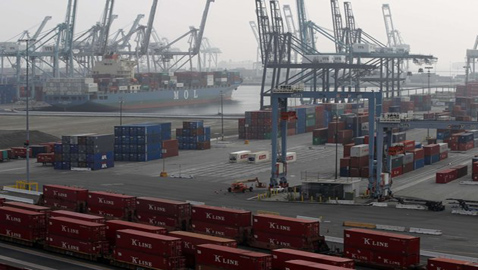Port Workers Get A Dollar An Hour Increase For Strike That Cost $8 Billion
Post Views 1
Reuters reports that the eight-day labor conflict cost Southern California an estimated $8 billion in lost wages and cargo that had to be rerouted to other ports. Economists calculated that the strike was preventing upwards of a $1 billion a day in cargo from passing through the ports.
The country’s retailers are perhaps the ones who are the most relieved that the ordeal is over and now feel assured that the movement of their goods will go unhindered. The 8-day strike had so seriously impacted their businesses, coming during the holiday season when transportation of goods speedily is of prime importance, that they called upon President Obama to intervene to resolve it.
Jonathan Gold of the National Retail Federation said that all were happy that a deal had finally been arrived at and expressed hope that the retailers and others who had suffered setback during the shutdown will quickly recover and things will be back to normal.
Port clerks returned to work happy even though they had won only modest increases in wage and pension benefits, in the new four-year contract that was drafted between the warring groups. However, they do have the guarantee that their jobs will not be outsourced to China, Arizona or other places.
According to the new contract the workers would get a raise of $1 an hour with immediate effect, and an additional increase of a similar amount the following year. However, raises for the last two years of the four-year contract were yet to be decided. Employees would also get $4000 each, for the two and half years they worked without a contract.
The strike was launched by the International Longshore and Warehouse Union Local 63 Office Clerical Unit which represents the 600 clerical workers at the affected ports.
Union spokesperson Craig Merrilees said that much more important than their short term gains was that they had manage to get the port administration to agree that job vacancies created by workers retiring or leaving over the next four years would continue to be filled and no more than fourteen jobs would be outsourced.
Merrilees said that their prime objective was to get some assurance on the issue of job outsourcing and they had succeeded in doing so. He accepted that when the new contract expires in 2016, the outsourcing issue would be a key element in forging new work policies and worker contracts.
The agreement was arrived at after mediators from the government, called by the mayor, had negotiations with the union officials. Even though both sides claimed they had made major concessions, the mayor addressing a news conference, said that issues of major concern were not addressed by either party.
John Fageaux, spokesman for Local 63 of the International Longshore and Warehouse Union, said his union had retracted from its demand to reinstate 51 positions that had been outsourced, however, there was no affirmative response from the employers, he alleged.
However, Stephen Berry, a shipping company representative refuted the charges saying that those jobs had never been outsourced in the first place and they were positions earlier held by clerical workers, but had not been filled once they became vacant.
Berry said that the companies had consented to one of the union’s major demands and agreed to hire certain temporary workers from the union’s pool of workers, rather than source them through external contractors.
He said that the union was unhappy with the offer, alleging that they were not very accepting of the fact that the economy was yet to recover and was still far off from its boom years.
Port Workers Get A Dollar An Hour Increase For Strike That Cost $8 Billion by Harrison Barnes


 Remember the 10 C’s in Your Management Style
Remember the 10 C’s in Your Management Style  Refocus Your Team in 27 Ways
Refocus Your Team in 27 Ways  Top 5 Areas You Should Cut Costs in Your Business in 2016
Top 5 Areas You Should Cut Costs in Your Business in 2016  What Does It Actually Cost to Hire a New Employee?
What Does It Actually Cost to Hire a New Employee?  Ten Tips to Help First-Time Managers Be Better
Ten Tips to Help First-Time Managers Be Better  CEO of Small Startup Lets Employees Vote for Management
CEO of Small Startup Lets Employees Vote for Management  Top 10 Ways to Effectively Manage a Team
Top 10 Ways to Effectively Manage a Team  Want to Attract Top Talent to Your Company? Have a Purpose
Want to Attract Top Talent to Your Company? Have a Purpose